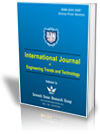An Assessment of a Psychometric Based Self Filtering Recruitment Agent in Zimbabwe
 |
International Journal of Engineering Trends and Technology (IJETT) |  |
| © 2014 by IJETT Journal | ||
| Volume-8 Number-4 |
||
| Year of Publication : 2014 | ||
| Authors : Pharaoh Chaka |
||
 10.14445/22315381/IJETT-V8P233 10.14445/22315381/IJETT-V8P233 |
Citation
Pharaoh Chaka."An Assessment of a Psychometric Based Self Filtering Recruitment Agent in Zimbabwe", International Journal of Engineering Trends and Technology(IJETT), V8(4),174-180 February 2014. ISSN:2231-5381. www.ijettjournal.org. published by seventh sense research group
Abstract
Nowadays the internet has the largest change in many aspects of human life and interaction. It has shown a dramatic change in business organizations ranging from the daily operations of the business, advertising as well as human resource management. The internet has recently acted as a conduit between employers and job seekers. Technology has enabled corporate websites, recruitment agencies and job seekers to become more sophisticated, interactive and to connect globally 24 hours a day, 7 days a week. Many graduate students now use the internet to source recruitment and employers also portray it as a pool to enrol the best candidates for their proposed vacancies. When an employer uses a recruitment site he or she is able to provide job seekers with detailed information on the qualifications they will be looking for in a candidate. One can even create a customized response form to help further qualify your applicants. A company can even put its recruitment brochure online, highlighting the benefits that it offer as well as what makes it stand out from the rest. The main challenge of Human resource managers along with line managers comes on the selection of the best prospective candidate for a particular job vacancy. The undertaken research is mainly focused on recruiting the best candidate for a particular job advertisement on corporate websites incorporating the idea of psychometric testing to enable filtering of candidates from the pool of those who might be interested in a vacant position in question. The reason for this is supported by an increase in the number of qualified graduates as well as other certified job seekers widespread all over the world. Although most of them will be qualified, most employers fear enrolling people who despite having the requirements, they might fail to perform the required job.
References
[1] Capgemini (2004) Online availability of public services: how is Europe progressing, 5th report for DG Information Society & Media
[2] Dineen B R, Ash SR, Noe R A (2002), ‘A Web of Applicant Attraction: Person-Organization Fit in the context of web based recruitment’, Journal of Applied Psychology, Vol. 87(4), pp. 723-734.
[3] hausorf PA, Duncan D (2004), ‘Firm size and ineternet recruiting Canada: A preliminary investigation’, Journal of Small Business Management, Vol. 42, pp.325-334.
[4] EPSO (2005) Civil Service Selection Procedures across Europe.
[5] CIPD (2005), Recruitment, Retention and Turnover Survey, Chartered Institute of Personnel Development
[6] (200), ‘Log on, Log in: corporate online recruitment in FTSE 100’, Recruitment and Retention: IRS Employment Review, 12 August.
[7] Enhance Media Ltd (2005), The National Online Recruitment Audience Survey, Winter.
[8] (2005), Graduate recruitment rising, survey finds, www.educationguardian.co.uk, 13 October.
[9] Lievens F, Harris M M (2003), ‘Research on Internet Recruiting and Testing: Current Status and Future Directions’, in Cooper C L, Robertson I T (eds), International Review of Industrial and Organisational Psychology, Vol. 18, John Wiley & Sons.
[10] (2005), ‘Online recruitment in the UK: 10 years older and wiser’, Recruitment and Retention: IRS Employer Review, 29 April.
[11] Barber L, Hill D, Hirsh W, Tyers C (2005), Fishing for talent in a Wider Pool: Trends and Dilemmas in Corporate Graduate Recruitment, IES Report 421.
[12] Kerrin M, Kettly P (2003), E-recruitment: is it delivering?, IES Report 402.
[13] Snell A (2003), Process savings through careers site best practices, www.ilogos.com/en/expertviews/articles/careers/20030429_Ashtml, accessed on 21/11/05
[14] Hausdorf PA, Duncan D (2004), ‘Firm size and Internet recruiting in Canada: A preliminary investigation’, Journal of Small Business Management, vol. 42, pp325-334.
[15] Bartram D (2001), Testing through the internet: Mapping the issues for managing the future, A practitioner Workshop, Practitioner Forum at the division of Occupational Psychology conference, Winchester, UK.
[16] Psychometric journal: Human Resource Management Training Courses in Singapore, Hong Kong and Online
[17] Lievens, F., & Harris, M.M. (2006). Research on Internet Recruiting and Testing
[18] Straus, S.G., Miles, J.A., & Levesque, L.L. (2004). The effects of video conference,telephone, and face-to-face media on interviewer and applicant judgments in employment interviews. Journal of Management, 27, 363-381.
[19] Travagline, A., & Frei, R.L. (200, April). 21st century recruiting: A model for Internet-based realistic job previews. Paper presented at the 16th Annual Conference of the Society for Industrial and Organizational Psychology, San Diego, CA.
[20] Weiss, E.M., & Barbeite, G.F. (2004). Internet as a job source and job site preference. Paper presented at the 16th Annual Conference of the Society for Industrial and Organizational Psychology, San Diego, CA.
Keywords
Internet, Psychometric test, Recruitment, Filtering candidates

